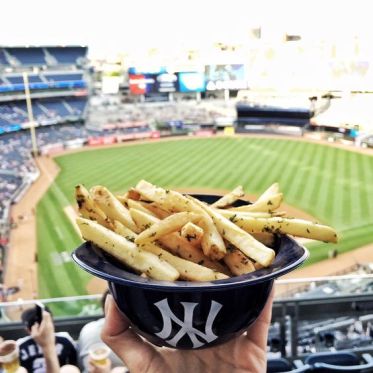Baseball season is upon us (and going wonderfully if you are a Phillies fan) which brings lots of excitement along with loads of good food. Hotdogs, popcorn, nachos and beer, it’s all part of the experience of watching the game. As a fan, it’s one thing to indulge in the stadium food, but for the players, being surrounded by this greasy culture has taken a toll.
In 2017, an agreement was made that every team needed chefs and a dietitian on staff. Before this point, the players liked the greasy foods and snacks that stadiums had to offer just as much as the fans; there was even a story of Babe Ruth asking a player for a hotdog during a game. Whether that anecdote is true or not, it’s undeniable that the diets these players were keeping did not match with the level of activity needed for the high stakes and high energy game of baseball.
And that is only the issue with food. There was also an immense use of tobacco products in the dugout, and this usage continues today even after the legal ban of it in 2016.

Today, team dietitians are urging better implemented diets into the athletes lives as a means of staying in the game longer and keeping themselves fit and healthy for as long as possible. The food you eat is a direct source of energy that will contribute to the level at which you perform. So keeping a healthy nutrient-rich diet is important as it will allow you to perform at a higher level, which is needed at the professional level. This is something taught in elementary school gym and health classes but is harder to live by when the culture of the sport is so immersed in these unhealthy foods.
The players themselves have adapted to these diet changes in many different ways. Luis Severino, a pitcher for the New York Yankees, cut off his love for fried food after experiencing several injuries. Since coming back, he has been working closely with a dietitian to stick to meals that help him during the games. The energy change is noticeable, as Severino said, “Before I started working with Drew [his dietician], I’d be out of energy after the fourth inning. After this, I feel great. My body recovers faster after a long inning.” Severino isn’t the only Yankees player to eat well. The team dietician said players such as Aaron Judge, Giancarlo Stanton and Anthony Rizzo go to him for advice on what’s best for their bodies
Obviously, these athletes are functioning adults who are very capable of leaving the stadium, going out and buying whatever unhealthy food they want after a day of enforced diets. Some athletes are less adaptable than Severino and have fallen back to the pattern of eating junk food because of the comfort or the superstition that stems from it.

Breaking a certain culture of food is no small feat. Sports and food go hand in hand in a very particular way. While it seems taunting to have the fans eat the food that the players are craving right in front of them, these newfound diets will make the games all the better. There has been a push in recent years to include healthier alternatives in stadium menus for the fans as well, which would ensure everyone in attendance was on the same page with their plate.




















